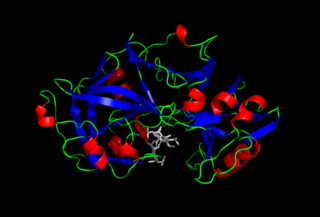| PGA5 | |||||||||||||||||||||||||||||||||||||||||||||||||||
|---|---|---|---|---|---|---|---|---|---|---|---|---|---|---|---|---|---|---|---|---|---|---|---|---|---|---|---|---|---|---|---|---|---|---|---|---|---|---|---|---|---|---|---|---|---|---|---|---|---|---|---|
 | |||||||||||||||||||||||||||||||||||||||||||||||||||
| Identifiers | |||||||||||||||||||||||||||||||||||||||||||||||||||
| Aliases | PGA5 , Pg5, pepsinogen 5, group I (pepsinogen A), pepsinogen A5 | ||||||||||||||||||||||||||||||||||||||||||||||||||
| External IDs | OMIM: 169730 HomoloGene: 68135 GeneCards: PGA5 | ||||||||||||||||||||||||||||||||||||||||||||||||||
| |||||||||||||||||||||||||||||||||||||||||||||||||||
| |||||||||||||||||||||||||||||||||||||||||||||||||||
| |||||||||||||||||||||||||||||||||||||||||||||||||||
| |||||||||||||||||||||||||||||||||||||||||||||||||||
| Wikidata | |||||||||||||||||||||||||||||||||||||||||||||||||||
| |||||||||||||||||||||||||||||||||||||||||||||||||||
Pepsinogen A is a protein that in humans is encoded by the PGA5 gene. [3]
| PGA5 | |||||||||||||||||||||||||||||||||||||||||||||||||||
|---|---|---|---|---|---|---|---|---|---|---|---|---|---|---|---|---|---|---|---|---|---|---|---|---|---|---|---|---|---|---|---|---|---|---|---|---|---|---|---|---|---|---|---|---|---|---|---|---|---|---|---|
 | |||||||||||||||||||||||||||||||||||||||||||||||||||
| Identifiers | |||||||||||||||||||||||||||||||||||||||||||||||||||
| Aliases | PGA5 , Pg5, pepsinogen 5, group I (pepsinogen A), pepsinogen A5 | ||||||||||||||||||||||||||||||||||||||||||||||||||
| External IDs | OMIM: 169730 HomoloGene: 68135 GeneCards: PGA5 | ||||||||||||||||||||||||||||||||||||||||||||||||||
| |||||||||||||||||||||||||||||||||||||||||||||||||||
| |||||||||||||||||||||||||||||||||||||||||||||||||||
| |||||||||||||||||||||||||||||||||||||||||||||||||||
| |||||||||||||||||||||||||||||||||||||||||||||||||||
| Wikidata | |||||||||||||||||||||||||||||||||||||||||||||||||||
| |||||||||||||||||||||||||||||||||||||||||||||||||||
Pepsinogen A is a protein that in humans is encoded by the PGA5 gene. [3]

Pepsin is an endopeptidase that breaks down proteins into smaller peptides. It is produced in the gastric chief cells of the stomach lining and is one of the main digestive enzymes in the digestive systems of humans and many other animals, where it helps digest the proteins in food. Pepsin is an aspartic protease, using a catalytic aspartate in its active site.

Deoxyribonuclease I, is an endonuclease of the DNase family coded by the human gene DNASE1. DNase I is a nuclease that cleaves DNA preferentially at phosphodiester linkages adjacent to a pyrimidine nucleotide, yielding 5'-phosphate-terminated polynucleotides with a free hydroxyl group on position 3', on average producing tetranucleotides. It acts on single-stranded DNA, double-stranded DNA, and chromatin. In addition to its role as a waste-management endonuclease, it has been suggested to be one of the deoxyribonucleases responsible for DNA fragmentation during apoptosis.

Lecithin–cholesterol acyltransferase is an enzyme, in many animals including humans, that converts free cholesterol into cholesteryl ester, which is then sequestered into the core of a lipoprotein particle, eventually making the newly synthesized HDL spherical and forcing the reaction to become unidirectional since the particles are removed from the surface. The enzyme is bound to high-density lipoproteins (HDLs) (alpha-LCAT) and LDLs (beta-LCAT) in the blood plasma. LCAT deficiency can cause impaired vision due to cholesterol corneal opacities, anemia, and kidney damage. It belongs to the family of phospholipid:diacylglycerol acyltransferases.

Inositol polyphosphate 5-phosphatase OCRL-1, also known as Lowe oculocerebrorenal syndrome protein, is an enzyme encoded by the OCRL gene located on the X chromosome in humans.

N-acetylgalactosamine-6-sulfatase is an enzyme that, in humans, is encoded by the GALNS gene.

Collagen alpha-2(V) chain is a protein that in humans is encoded by the COL5A2 gene.

Glycine decarboxylase also known as glycine cleavage system P protein or glycine dehydrogenase is an enzyme that in humans is encoded by the GLDC gene.

2'-5'-oligoadenylate synthetase 1 is an enzyme that in humans is encoded by the OAS1 gene.

Collagen alpha-3(IV) chain is a protein that in humans is encoded by the COL4A3 gene.

alpha-2-HS-glycoprotein also known as fetuin-A is a protein that in humans is encoded by the AHSG gene. Fetuin-A belongs to the fetuin class of plasma binding proteins and is more abundant in fetal than adult blood.

Serine—pyruvate aminotransferase is an enzyme that in humans is encoded by the AGXT gene.

Gamma-enolase, also known as enolase 2 (ENO2) or neuron specific enolase (NSE), is an enzyme that in humans is encoded by the ENO2 gene. Gamma-enolase is a phosphopyruvate hydratase.
Progastricsin also known as pepsinogen C or pepsinogen II is a pepsinogen precursor of the enzyme gastricsin that in humans is encoded by the PGC gene.

Chloride channel Kb, also known as CLCNKB, is a protein which in humans is encoded by the CLCNKB gene.

Homeobox A4, also known as HOXA4, is a protein which in humans is encoded by the HOXA4 gene.

Acetylcholine receptor subunit gamma is a protein that in humans is encoded by the CHRNG gene.

Krueppel-like factor 9 is a protein that in humans is encoded by the KLF9 gene. Previously known as Basic Transcription Element Binding Protein 1, Klf9 is part of the Sp1 C2H2-type zinc finger family of transcription factors. Several previous studies showed Klf9-related regulation of animal development, including cell differentiation of B cells, keratinocytes, and neurons. Klf9 is also a key transcriptional regulator for uterine endometrial cell proliferation, adhesion, and differentiation, all factors that are essential during the process of pregnancy and are turned off during tumorigenesis.

Nephrocystin-3 is a protein that in humans is encoded by the NPHP3 gene.

Wingless-type MMTV integration site family, member 2, also known as WNT2, is a human gene.

Pepsinogen 3, group I is a protein that in humans is encoded by the PGA3 gene.